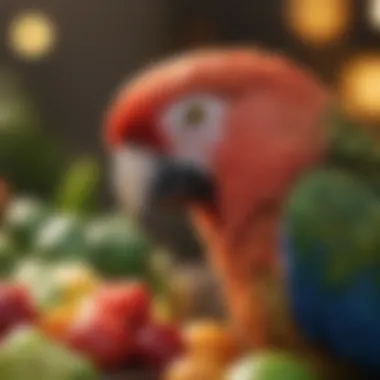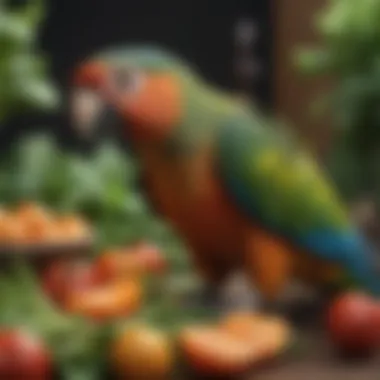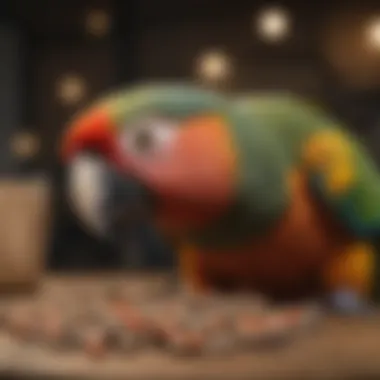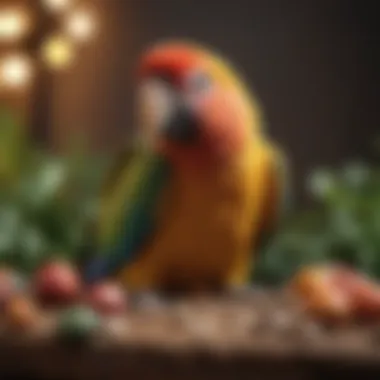Understanding Parrot Dietary Needs: A Complete Guide


Intro
Parrots are not merely colorful companions but are complex creatures with specialized dietary needs. Understanding their nutrition is pivotal for pet owners who wish to promote the health and longevity of these vibrant birds. With various species and individual preferences, the dietary landscape can seem overwhelming. However, by delving into the essential components of a parrot's diet, we provide a foundation for informed care.
In this guide, we will explore the nutritional requirements of parrots, emphasizing different food categories. We will also address common misconceptions about parrot diets, and offer practical feeding tips. Ultimately, this comprehensive examination aims to enrich the relationship between parrots and their human caretakers.
Animal Overview
Common Names
Parrots are commonly referred to by various names depending on species and characteristics. Some popular ones include the African Grey, Amazon Parrot, and Budgerigar. Each name reflects unique traits that cater to different audiences, from bird enthusiasts to casual pet owners.
Scientific Classification
Parrots belong to the family Psittacidae, encompassing around 393 species. Within this family, parrots are further categorized into subfamilies, tribes, and genera. Understanding their scientific classification helps clarify their behavior, habitat, and diet, critical aspects of their care.
Geographic Range
Parrots are predominantly found in tropical and subtropical regions. Their natural habitats stretch from Central and South America to Australia and parts of Africa. A better grasp of their geographic range enhances understanding of their native diets and environmental preferences.
Behavior and Social Structure
Social Behavior
Parrots are inherently social animals, often forming tight-knit bonds with their companions, whether human or avian. This social nature influences their feeding habits, as they often thrive in group settings. Social interactions can induce stress, and nutrition plays a role in maintaining harmony in captive environments.
Communication
Communication is another crucial aspect of parrot behavior. They use vocalizations and body language to express feelings and establish connections. A well-nourished parrot tends to exhibit vibrant communication skills, which can decrease with a poor diet.
Mating and Reproduction
Understanding mating and reproduction habits is beneficial for those considering breeding. Parrots will often establish intricate courtship rituals, with feeding behavior playing a part in attracting partners. Healthy diets are essential for reproductive success.
Habitat and Ecosystem
Natural Habitat
In the wild, parrots inhabit a variety of ecosystems, ranging from rainforests to grasslands. These spaces provide access to diverse dietary resources, including fruits, seeds, and flowers. Observing their natural habitats aids in replicating suitable environments in captivity.
Food Sources and Diet
Parrots consume a varied diet in their natural setting. Common food sources include:
- Fruits such as berries and mangoes
- Nuts and seeds from trees
- Leaves and vegetables
This diversity ensures a balanced nutrient intake, vital for their health.
Role in Ecosystem
Parrots play a significant role in their ecosystems as seed dispersers. Their feeding habits help maintain plant populations, which contributes to overall biodiversity. Understanding this role highlights the importance of preserving their natural habitats and ensuring they receive appropriate diets in captivity.
Important Note: Proper nutrition can prevent many health issues in parrots. A diet lacking in variety may lead to deficiencies, affecting their overall well-being.
Through this structured understanding of parrots, we can transition seamlessly into discussing their specific dietary needs. This further examination will cover food categories, dietary restrictions, and feeding practices, clarifying how to best cater to these remarkable birds.
Preamble to Parrot Nutrition
Parrots are social, intelligent creatures that thrive on mental and physical stimulation. Integral to their well-being is an understanding of parrot nutrition. Nutrition goes beyond mere sustenance; it impacts every aspect of a parrot's life, from behavior to longevity. A proper diet can enhance their vibrant plumage and improve their overall health.


Understanding Parrot Dietary Needs
Parrots are omnivores, requiring a variety of foods to meet their nutritional demands. They need proteins, fats, carbohydrates, vitamins, and minerals. Each species may have unique needs based on its geographic origin and lifestyle.
In the wild, parrots consume a diverse diet of fruits, nuts, seeds, and vegetation. Captive parrots, however, often receive unbalanced diets, largely dominated by seeds. This can lead to nutritional deficiencies that affect their health. Understanding dietary needs is crucial for their owners. It involves offering a range of foods that closely mimic their natural diet.
Factors like age, species, and activity level influence what and how much they should eat. Young parrots require more protein for growth, while older parrots may need fewer calories but increased vitamins.
Importance of a Balanced Diet
A balanced diet is essential for parrots. It should include a mix of fruits, vegetables, pellets, and occasional seeds and nuts. Each category offers distinctive benefits:
- Fruits: Rich in vitamins and antioxidants, they support the immune system.
- Vegetables: Provide fiber, which is important for digestive health.
- Pellets: Often formulated to include all necessary nutrients and can serve as a staple food option.
- Seeds and nuts: Offer healthy fats but should be given in moderation.
Improper nutrition can result in serious health problems. Common issues include obesity, liver disease, and feather plucking. By ensuring a balanced diet, you also promote better behavior. Parrots with the correct nutrients tend to be less aggressive and more sociable.
A balanced diet is not just about variety; it's about integrating foods that contribute positively to a parrot's physical and mental well-being.
Essential Food Groups for Parrots
Understanding the essential food groups for parrots is key to ensuring their well-being and health. Each group plays a crucial role in providing the necessary nutrients that effect their longevity and vitality. Parrots require a diverse diet to sustain their complex biology and behavior. It’s not just about satisfying hunger; it's also about providing a balanced intake that supports all life functions.
Fruits and Their Benefits
Fruits stand out in parrot diets because they offer natural sugars, fiber, and various vitamins. They serve as delicious treats that parrots often enjoy, making them a popular choice among bird owners. Plus, the vibrant colors and textures of fruits stimulate a parrot’s senses, providing not only nourishment but also mental engagement.
Common Fruits Safe for Parrots
Common fruits such as apples, bananas, and berries are excellent additions to a parrot's diet. They are generally safe and provide different nutrients. Apples, for instance, provide hydration and fiber which helps in digestion. Berries like blueberries are high in antioxidants, supporting the immune system. However, it is important to remove any seeds from apples as they can be toxic.
Nutritional Value of Fruits
The nutritional value of fruits is significant in a parrot’s diet. Fruits are rich in vitamins A and C, both essential for maintaining healthy skin and feathers. Additionally, fruits provide minerals such as calcium and potassium, which help in supporting overall health. However, fruits should only make up about 10-20% of the overall diet. Too much sugar can lead to obesity and health issues.
Vegetables: A Vital Component
Vegetables are another essential component of a healthy parrot diet. They are often overlooked, but they should not be underestimated. When provided in a variety of forms, they can keep a parrot excited about meal times and ensure they receive important nutrients.
Types of Vegetables for Parrots
Types of vegetables that are safe include leafy greens like kale and spinach, as well as crunchy vegetables like carrots and bell peppers. Leafy greens are high in vitamins and provide hydration. Carrots are a good source of beta-carotene, promoting good vision. It’s important to rotate the vegetables offered to ensure a range of nutrients and avoid boredom in the parrot.
Preparation and Serving Suggestions
Preparation is key when serving vegetables. Rinse them thoroughly to remove pesticides and dirt. It's also beneficial to offer vegetables in different forms: raw, steamed, or chopped. This variety not only enhances nutritional value but also presents new textures for the parrot to explore. Serving vegetables alongside fruits can also create a visually appealing meal.
Pellets: A Balanced Option
Pellets are often considered a balanced diet for parrots. They are designed to meet the nutritional needs of parrots and can provide a reliable food source. A good pellet will contain balanced amounts of proteins, carbohydrates, fats, vitamins, and minerals.
Benefits of Pellet Diets
The benefits of pellet diets include convenience and nutritional completeness. Pellets eliminate the guesswork involved in feeding fresh foods. They are formulated to ensure that parrots receive essential nutrients that they might miss in a seed-only diet. However, relying solely on pellets isn’t recommended; variety remains important.
Choosing Quality Pellets
Choosing quality pellets is critical. Look for brands that list whole foods as primary ingredients without artificial additives. Analyze the guaranteed analysis on the bag for the percentage of protein, fiber, and fat to ensure they meet your parrot's specific needs. Quality pellets may be more expensive, but they offer better nutrition.
Seeds: A Nutritional Debate
There is ongoing debate regarding the role of seeds in parrot diets. On one hand, seeds are high in fats which can give parrots energy. On the other hand, a seed-heavy diet may lead to obesity and nutritional deficiencies.


Pros and Cons of Seed Diets
The pros of seed diets include their high energy content, which can be particularly appealing to active birds. However, seeds alone do not provide the complete nutrients that parrots require. They might also promote selective eating, where parrots pick only their favorite seeds, leaving important nutrients behind.
Seed Varieties to Consider
Some seed varieties that are less fatty include millet and canary seed. While seeds can be a treat, they should not be the main component of the diet. Offering seeds sparingly as part of a varied diet is wise. Consider mixing seeds with pellets and fresh foods for balance.
Nuts and Their Role
Nuts are often seen as a treat for parrots. They are rich in healthy fats, proteins, and essential nutrients. However, they should be offered in moderation due to their high-calorie content.
Safe Nut Choices
Safe nut choices include almonds, walnuts, and pistachios. These nuts are generally well-received by parrots and deliver important nutrients. It is best to avoid salted or flavored nuts as they can harm the bird's health. Offering nuts as an occasional treat enhances variety in the diet.
Moderation in Nut Consumption
Moderation in nut consumption is essential. Although nuts provide many benefits, overconsumption can lead to obesity. A few nuts a few times a week is a good guideline. Monitoring the weight and eating habits of the parrot helps ensure it stays healthy.
Grains and Legumes
Incorporating whole grains and legumes can add necessary protein and fiber to a parrot’s diet. These foods also offer diversity and can help in the overall health of your pet.
Nutritional Aspects of Whole Grains
Whole grains are high in fiber and can aid in digestion. Quinoa and brown rice are excellent choices. These grains provide carbohydrates that can help maintain energy levels during the day. Be cautious of processed grains, which may lack essential nutrients.
Beneficial Legumes
Legumes such as lentils and chickpeas are excellent protein sources. They make great additions to a parrot's diet, especially if cooked properly. Legumes can help with overall digestion and nutrient absorption. Just be sure to introduce them slowly into the diet to avoid any digestive upset.
Foods to Avoid
Eating the right food is crucial for parrot health. Not everything that is safe for humans is safe for birds. This section focuses on foods that should never be part of a parrot’s diet. Knowing these foods is essential for pet owners. Improper feeding can lead to serious health risks.
Toxic Foods for Parrots
Common Hazardous Foods
There are many foods that are hazardous to parrots. Some common examples include avocado, chocolate, caffeine, and alcohol. Each poses a unique risk due to the specific substances they contain.
- Avocado: Contains persin, which is toxic to birds. Even small amounts can be harmful. It blocks normal heart function and can lead to respiratory distress.
- Chocolate: Contains theobromine that is toxic to multiple animals, including parrots. It can cause vomiting, diarrhea, and even more severe health issues.
- Caffeine: Found in coffee, tea, and some sodas. It can lead to high heart rates and high blood pressure in birds.
- Alcohol: Even small amounts can lead to serious poisoning. A bird's liver cannot process alcohol efficiently, which can be deadly.
Recognizing these foods is vital. Their inclusion in a diet can be extremely harmful, leading to severe health complications.
Signs of Food Poisoning
If a parrot eats something toxic, signs of food poisoning are critical to notice quickly. Common symptoms include lethargy, decreased appetite, digestive issues like diarrhea, and unusual behavior.
- Lethargy: A noticeable drop in energy levels is common.
- Reduced Appetite: A parrot may refuse food completely or not eat as often.
- Digestive Problems: Vomiting or diarrhea may be apparent.
- Behavior Changes: Nervousness or agitation can occur.
Observing these signs can help in early detection. Immediate attention from a vet is needed if food poisoning symptoms are present. This knowledge can save a bird's life.
Impact of Processed Foods
Processed foods often lack essential nutrients that parrots require. These foods might be cheap but can lead to an unbalanced diet. High sugar and sodium content in processed snacks is harmful. Since birds have different needs than humans, processed foods should be avoided. Feeding parrots whole, natural foods will always offer more health benefits.
Feeding Practices for Parrots


Feeding practices are crucial in maintaining the health and well-being of parrots. Just like humans, birds require consistent, nutritious food to thrive. A proper feeding routine not only ensures that parrots receive the nutrients they need, but it also contributes to their overall behavioral health. Feeding practices encompass several elements, including timing, portion sizes, and the diversity of food offered. Each aspect plays a significant role in promoting optimal health and preventing dietary-related issues.
Recommended Feeding Schedule
A structured feeding schedule is essential for the well-being of parrots. Most parrots thrive when fed two times a day. Morning and evening meals allow their metabolism to function effectively. This schedule mirrors their natural foraging behavior, which can help reduce stress and anxiety. Moreover, establishing a routine can encourage a sense of security in your pet.
Here are some tips for a successful feeding schedule:
- Consistency: Feed at the same times daily to promote good habits.
- Observation: Monitor how much your parrot eats at each meal. Adjust timing as needed based on their behavior.
- Avoid Overfeeding: Limiting snack times can help ensure they eat their main meals fully.
Portion Control and Overfeeding
Portion control is vital to prevent obesity and other health complications in parrots. While it may be tempting to overfeed, especially if a parrot seems hungry, this can lead to serious issues, such as liver disease, heart problems, and other metabolic disorders.
To control portions, consider these steps:
- Weigh Food: Use a scale to measure out precise portions suitable for your bird's size and species.
- Monitor Weight: Regular check-ups will help track your parrot's weight and health condition. Adjust food quantities according to changes in weight.
Key Point: Overfeeding can be as harmful as underfeeding. Always be cautious.
Incorporating Variety
Variety is important for a parrot's diet. Offering a range of foods stimulates their interest and encourages natural foraging. Different foods provide distinct nutrients that support overall health. A diet consisting solely of pellets or seeds may lack essential vitamins and minerals.
Consider these strategies for incorporating variety:
- Different Food Groups: Include fruits, vegetables, grains, and protein sources alongside standard pellets. Each group has unique nutritional benefits.
- Experimentation: Change up the menu regularly. Introduce new fruits and veggies, but do so gradually to avoid digestive issues.
- Observation: Take note of which foods your parrot prefers. Adjust their diet based on their taste and health needs.
By prioritizing feeding practices, pet owners can create a sustainable, nutritious feeding plan that meets the dietary needs of their parrots, promoting longevity and vitality.
Understanding Nutritional Deficiencies
Understanding nutritional deficiencies in parrots is essential for ensuring their overall health and well-being. Just like any animal, parrots require a variety of nutrients to thrive. Deficiencies can lead to serious health issues, affecting their physical condition and behavior. Identifying and addressing these deficiencies is key in providing quality care. It helps pet owners understand specific nutritional needs and promotes informed feeding practices that support the vitality of these intelligent birds.
Common Deficiencies in Parrots
Nutritional deficiencies occur when parrots lack essential nutrients in their diet. Some of the most common deficiencies observed in parrots include Vitamin A, calcium, and iodine deficiencies. Each of these deficiencies presents specific symptoms that can help diagnose the issue.
Symptoms and Effects
Symptoms of nutritional deficiencies can vary widely based on the nutrient lacking in the diet. For instance, Vitamin A deficiency can lead to respiratory problems and skin issues, while calcium deficiency may result in weakened bones and eggshell quality. These symptoms are significant indicators of an imbalanced diet and, if left untreated, can affect the bird's quality of life.
The effects of these deficiencies can also foster long-term health problems. Common symptoms include lethargy, changes in feather condition, and behavioral changes such as excessive screaming or aggression. Recognizing these signs early can be beneficial for swift intervention between the owner and a veterinarian.
Prevention Strategies
Prevention strategies are vital to avoid nutritional deficiencies in parrots. A well-planned diet incorporating a variety of foods is crucial. Understanding which nutrients are needed and the best sources for these nutrients can help create a balanced diet. It's important to ensure that fresh fruits and vegetables, suitable pellets, and other foods are consistently available.
A key prevention characteristic involves regular dietary assessments. Substituting different foods can prevent the risks of deficiencies. Owners should monitor their parrots for any changes in behavior or health. This proactive approach not only prevents deficiencies but supports overall vitality.
Regular consultation with an avian veterinarian can help owners determine if their parrot's diet meets its nutritional needs. Tailoring dietary plans based on individual requirements is a unique feature that can deliver great advantages for the health and longevity of the birds.
Correct and enriched nutrition is the foundation of a healthy life for every parrot.
End
In wrapping up this exploration of parrot nutrition, it is crucial to emphasize the significance of a balanced and species-appropriate diet. Proper nutrition plays a vital role in the health and longevity of parrots. Understanding their dietary needs ensures that pet owners can provide the best possible care for these intelligent creatures.
Recap of Key Points
Throughout the article, several key points emerge regarding parrot nutrition:
- A balanced diet must include fruits, vegetables, pellets, nuts, and grains.
- Awareness of toxic foods is essential to prevent health issues.
- Feeding practices such as portion control and variety enhance nutritional quality.
- Common deficiencies in parrots include vitamin A deficiency and calcium deficiency, which can lead to serious health problems.
- Regular monitoring of eating habits and behavioral changes is important for ensuring well-being.
Final Thoughts on Parrot Nutrition
Nurturing a parrot goes beyond just housing and companionship; it requires an understanding of their specific dietary needs. A well-rounded diet not only contributes to their physical health but also supports mental vitality. Every parrot is unique, making it essential to cater to individual preferences and health concerns. Educating oneself on appropriate dietary requirements sets the foundation for a thriving relationship with these remarkable birds.







